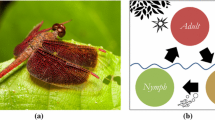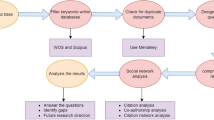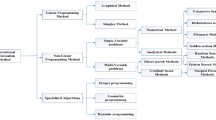Abstract
Evolutionary algorithms are among the most common techniques developed to address dynamic optimization problems. They either assume that changes in the environment are known a priori, especially for some benchmark problems, or detect these changes. On the other hand, detecting the points in time where a change occurs in the landscape is a critical issue. In this paper, we investigate the performance evaluation of various sensor-based detection schemes on the moving peaks benchmark and the dynamic knapsack problem. Our empirical study validates the performance of the sensor-based detection schemes considered, by using the average rate of correctly identified changes and number of sensors invoked to detect a change. We also propose a new mechanism to evaluate the capability of the detection schemes for determining severity of changes. Additionally, a novel hybrid approach is proposed by integrating the change detection schemes with evolutionary dynamic optimization algorithms in order to set algorithm-specific parameters dynamically. The experimental evaluation validates that our extensions outperform the reference algorithms for various characteristics of dynamism.















Similar content being viewed by others
References
Altin L, Topcuoglu H (2014) Performance evaluation of sensor-based detection schemes on dynamic optimization problems. In: IEEE symposium on computational intelligence in dynamic and uncertain environments, CIDUE, Orlando, December 9–12, pp 24–31
Altin L, Topcuoglu H, Ermis M (2015) Evolutionary dynamic optimization techniques for marine contamination problem. In: Genetic and evolutionary computation conference, GECCO 2015, Madrid, July 11–15, 2015, companion material proceedings, pp 889–892
Amelio A, Pizzuti C (2015) An evolutionary dynamic optimization framework for structure change detection of streaming networks. In: Conference: 6th international conference on information, intelligence, systems and applications (IISA 2015). IEEE CS Press, At Corfu Greece
Ayvaz D, Topcuoglu H, Gürgen F (2012) Performance evaluation of evolutionary heuristics in dynamic environments. Appl Intell 37(1):130–144
Branke J (1999) Memory-enhanced evolutionary algorithms for changing optimization problems. In: Congress on evolutionary computation (CEC’99). IEEE, pp 1875–1882
Branke J (2001) Evolutionary optimization in dynamic environments. Kluwer Academic Publishers, Norwell
Branke J, Kaussler T, Smidt C, Schmeck H (2000) A multi-population approach to dynamic optimization problems. In: Parmee IC (ed) Evolutionary Design and Manufacture: Selected Papers from ACDM ’00. Springer, London. doi:10.1007/978-1-4471-0519-0_24
Branke J, Salihoglu E, Uyar S (2005) Towards an analysis of dynamic environments. In: Proceedings of the 2005 conference on genetic and evolutionary computation (GECCO), New York, pp 1433–1440
Bravo Y, Luque G, Alba E (2015a) Global memory schemes for dynamic optimization. Nat Comput 15:1–15
Bravo Y, Luque G, Alba E (2015b) Takeover time in evolutionary dynamic optimization: from theory to practice. Appl Math Comput 250:94–104
Carlos C, González J, Pelta D (2011) Optimization in dynamic environments: a survey on problems, methods and measures. Soft Comput 15(7):1427–1448
Cheng H, Yang S, Xingwei W (2012) Immigrants-enhanced multi-population genetic algorithms for dynamic shortest path routing problems in mobile ad hoc networks. Appl Artif Intell 26(7):673–695
Cobb H (1991) An investigation into the use of hypermutation as an adaptive operator in genetic algorithms having continuous, time-dependent nonstationary environments. Technical report AIC-90-001, Navy Center for Applied Research in Artificial Intelligence
Cobb H, Gerfenstette J (1993) Genetic algorithms for tracking changing environment. In: Proceedings of the international conference on genetic algorithms (ICGA), pp 523–530
Cruz C, Juan R, Pelta D (2011) Optimization in dynamic environments: a survey on problems, methods and measures. Soft Comput 15:1427–1448
Eberhart RC, Shi Y (2001) Tracking and optimizing dynamic systems with particle swarms. In: Proceedings of the 2001 congress on evolutionary computation, vol 1, pp 94–100
Fetanat M, Haghzad S, Shouraki SB (2015) Optimization of dynamic mobile robot path planning based on evolutionary methods. In: 2015 AI rbotics (IRANOPEN), pp 1–7
Fu H, Lewis PR, Sendhoff B, Tang K, Yao X (2014) What are dynamic optimization problems? In: Proceedings of the IEEE congress on evolutionary computation, CEC 2014, Beijing, July 6–11, 2014, pp 1550–1557
Grefenstette J (1992) Genetic algorithms for changing environments. In: Parallel problem solving from nature 2, PPSN-II, Brussels. Elsevier, pp 139–146
Haribaskar K, Karnan M (2013) Artificial bee colony: for detecting dynamic shortest path routing problems in mobile ad hoc networks. Eur J Sci Res 98:7–15
Hossain MA, Ferdous I (2015) Autonomous robot path planning in dynamic environment using a new optimization technique inspired by bacterial foraging technique. Robot Auton Syst 64:137–141
Janson S, Middendorf M (2006) A hierarchical particle swarm optimizer for noisy and dynamic environments. Genet Program Evol Mach 7(4):329–354
Kellerer H, Pferschy U, Pisinger D (2004) Knapsack problems. Springer, Berlin
Kiraz B, Etaner-Uyar A, Ozcan E (2013) Selection hyper-heuristics in dynamic environments. J Oper Res Soc 64(12):1753–1769
Li C, Yang S, Yang M (2014) An adaptive multi-swarm optimizer for dynamic optimization problems. Evol Comput 22(4):559–594
Mack Y, Goel T, Shyy W, Haftka R (2007) Surrogate model-based optimization framework: a case study in aerospace design. In: Yang S, Ong Y-S, Jin Y (eds) Evolutionary computation in dynamic and uncertain environments, vol 51. Springer, Berlin, Heidelberg, pp 323–342. doi:10.1007/978-3-540-49774-5_14
Mavrovouniotis M, Yang S (2013) Ant colony optimization with immigrants schemes for the dynamic travelling salesman problem with traffic factors. Appl Soft Comput 13(10):4023–4037
Michalewicz Z, Schmidt M, Michalewicz M, Chiriac C (2007) Adaptive business intelligence: three case studies. In: Yang S, Ong Y-S, Jin Y (eds) Evolutionary computation in dynamic and uncertain environments. vol 51. Springer, Heidelberg, pp 179–196. doi:10.1007/978-3-540-49774-5_8
Montemanni R, Gambardella LM, Rizzoli AE, Donati AV (2005) Ant colony system for a dynamic vehicle routing problem. J Comb Optim 10(4):327–343
Morrison R (2004) Designing evolutionary algorithms for dynamic environments. Springer, Berlin
Nakano H, Kojima M, Miyauchi A (2015) An artificial bee colony algorithm with a memory scheme for dynamic optimization problems. In: 2015 IEEE congress on Evolutionary computation (CEC), pp 2657–2663
Nguyen T, Yang S, Branke J (2012) Evolutionary dynamic optimization: a survey of the state of the art. Swarm Evolut Comput 6:1–24
Nguyen TT, Yao X (2009) Dynamic time-linkage problems revisited. In: Giacobini M, Brabazon A, Cagnoni S, Di Caro G, Ekrt A, Esparcia-Alczar A, Farooq M, Fink A, Machado P (eds) Applications of evolutionary computing, volume 5484 of lecture notes in computer science. Springer, Berlin, pp 735–744
Pillac V, Gendreau M, Gueret C, Medaglia A (2013) A review of dynamic vehicle routing problems. Eur J Oper Res 225(1):1–11
Richter H (2009) Detecting change in dynamic fitness landscapes. In: IEEE congress on evolutionary computation, pp 1613–1620
Rohlfshagen P, Yao X (2009) The dynamic knapsack problem revisited: a new benchmark problem for dynamic combinatorial optimisation. In: EvoWorkshops, pp 745–754
Saleem S, Reynolds R (2000) Cultural algorithms in dynamic environments. In: Proceedings of the 2000 congress on evolutionary computation, vol 2, pp 1513–1520
Sun G, Zhao R (2014) Dynamic partition search algorithm for global numerical optimization. Appl Intell 41(4):1108–1126
Topcuoglu H, Ucar A, Altin L (2014) A hyper-heuristic based framework for dynamic optimization problems. Appl Soft Comput 19:236–251
Ursem R (2000) Multinational gas: multimodal optimization techniques in dynamic environments. In: Genetic and evolutionary computation conference (GECCO), pp 19–26
Yang S, Yao X (2005) Experimental study on population-based incremental learning algorithms for dynamic optimization problems. Soft Comput 9:815–834
Yang S, Yao X (2013) Evolutionary computation for dynamic optimization problems. Springer, Berlin
Yi J, Gao L, Li X, Gao J (2015) An efficient modified harmony search algorithm with intersect mutation operator and cellular local search for continuous function optimization problems. Appl Intell 44(3):725–753
Acknowledgements
A preliminary version of this paper was published in the Proceedings of 2014 IEEE Symposium Series on Computational Intelligence (SSCI 2014) (Altin and Topcuoglu 2014). This research was supported by The Marmara University Scientific Research Committee with a research Grant (Project Number: FEN-A-110915-0432, 2015). The authors would like to thank to anonymous referees for their helpful comments and suggestions to improve this paper.
Author information
Authors and Affiliations
Corresponding author
Ethics declarations
Conflict of interest
The authors declare that they have no conflict of interest.
Additional information
Communicated by V. Loia.
Rights and permissions
About this article
Cite this article
Altin, L., Topcuoglu, H.R. Impact of sensor-based change detection schemes on the performance of evolutionary dynamic optimization techniques. Soft Comput 22, 4741–4762 (2018). https://doi.org/10.1007/s00500-017-2660-1
Published:
Issue Date:
DOI: https://doi.org/10.1007/s00500-017-2660-1




